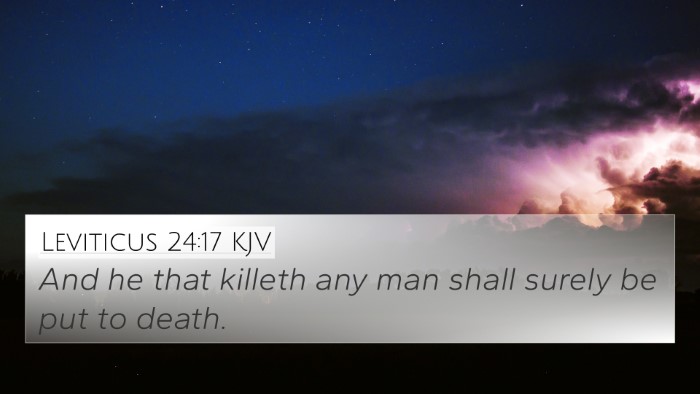Understanding Leviticus 24:21
Verse: "And he that killeth a beast shall make it good; beast for beast." (Leviticus 24:21)
Meaning and Interpretation
This verse emphasizes the principle of retribution and fairness in justice, particularly in terms of compensation for loss or harm. The law reflects God's desire for equity and morality within the community of Israel.
Insights from Commentaries
-
Matthew Henry:
Henry highlights that this statute serves to regulate justice regarding personal property. It illustrates God's concern for the welfare of His creation, ensuring that no one should gain unjustly at the expense of another. The call for "beast for beast" suggests a strict equivalence in the reparation process, acting as a deterrent against irresponsible behavior.
-
Albert Barnes:
Barnes notes that the principle here presents a binary choice in handling damages. It upholds that one should not only fulfill the demands of justice but also maintain accountability for their actions. This verse serves as a legal and moral standard for operations within society.
-
Adam Clarke:
Clarke elaborates on the principle of proportionality in justice. He reflects on the larger context of the laws given to Israel, emphasizing that this form of justice underscores a community divine structure meant to promote order and respect among individuals.
Cross-Referencing Related Bible Verses
In studying Leviticus 24:21, we can identify several vital connections that highlight similar themes of justice and retribution throughout Scripture:
- Exodus 21:23-25: "But if there is serious injury, you are to take life for life, eye for eye, tooth for tooth, hand for hand, foot for foot..." - This passage further confirms the principle of retributive justice.
- Numbers 35:31: "You must not accept a ransom for the life of a murderer, who deserves to die. They are to be put to death." - Emphasizes the importance of justice in the community regarding life and societal order.
- Deuteronomy 19:21: "Show no pity: life for life, eye for eye, tooth for tooth, hand for hand, foot for foot." - Reinforces the same principle of equal retribution and fairness to victims.
- Matthew 5:38-39: "You have heard that it was said, 'Eye for eye, and tooth for tooth.' But I tell you, do not resist an evil person..." - This New Testament text introduces a transformative view of justice, shifting towards mercy.
- Romans 12:19: "Do not take revenge, my dear friends, but leave room for God's wrath, for it is written: 'It is mine to avenge; I will repay,' says the Lord." - Discusses the theme of divine justice versus human retribution.
- Galatians 6:7: "Do not be deceived: God cannot be mocked. A man reaps what he sows." - Illustrates the broader spiritual law of reaping consequences reflective of one's actions.
- James 2:13: "Because judgment without mercy will be shown to anyone who has not been merciful. Mercy triumphs over judgment!" - Addresses the balance between justice and mercy in the Christian experience.
Thematic Connections
Thematically, Leviticus 24:21 connects deeply with the ideas of justice, accountability, and moral responsibility within both the Old and New Testaments. These connections illustrate God’s consistent nature in upholding righteousness and requiring humanity to respond justly to one another.
Practical Implications
In contemporary application, these scriptures encourage believers to consider the importance of fairness in their judgments and the way they interact with others. Understanding biblical justice can guide personal and communal relationships, encouraging a culture of respect and accountability.
Conclusion
Leviticus 24:21 enriches our understanding of God's design for justice within His community. By studying this verse and its connections through biblical cross-referencing, we can deepen our understanding of divine principles and apply them to modern-day dilemmas.




